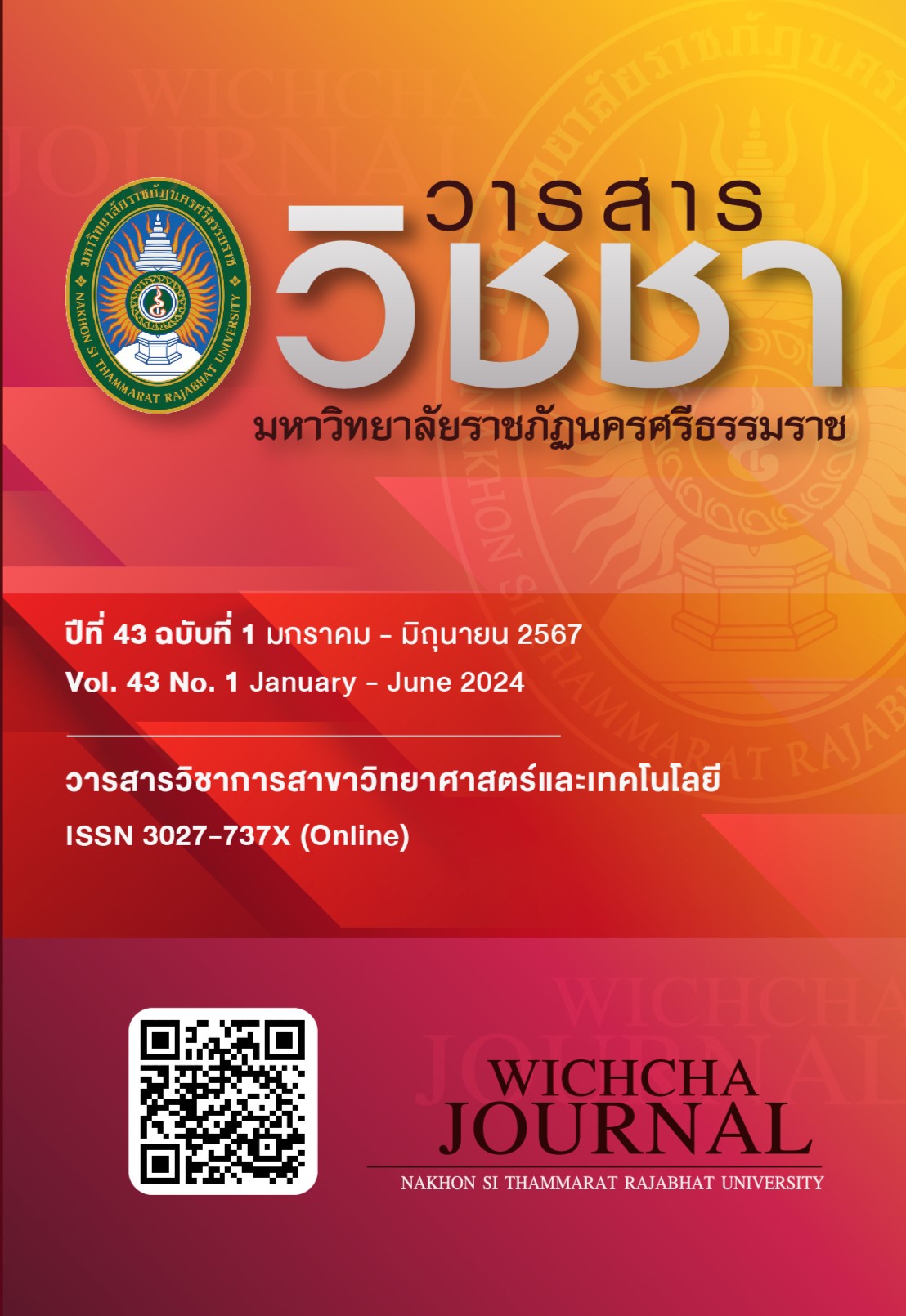Carbon Storages in Tropical Rain Forest, Case Study: Ban Papong Community Forest, Thamod District, Phatthalung Province
Main Article Content
Abstract
The research objective was to evaluate carbon storages in tree biomass, soil (0-30 centimeter (cm) depth) and evaluate the potential for carbon dioxide adsorption in tropical rain forest, Ban Papong Community Forest, Thamod district, Phatthalung province. The random sampling for surveying of plant species was undertaken by 40x50 square meter (m2) sample plot (6 plots). The results showed that the plants in Ban Papong Community Forest composed of 99 species, 72 genus in 41 families, which were divided into the group of trees that contain 74 tree species, 58 genus in 34 families, 72 sapling species, 57 genus in 31 families and 50 seedling species, 44 genus in 27 families. Ban Papong Community Forest had a total of carbon sequestration 158.30 tonne carbon per hectare (C/ha), in plant biomass 134.36 tonne C/ha (131.46 tonne C/ha in tree, 2.42 tonne C/ha in sapling and 0.48 tonne C/ha in seedling) and 23.94 tonne C/ha of carbon sequestration in soil. Most of the carbon stored in biomass was 84.87%. The Ban Papong Community Forest can adsorb CO2 580.43 tonne carbon dioxide per hectare (CO2/ha).
Article Details

This work is licensed under a Creative Commons Attribution-NonCommercial-NoDerivatives 4.0 International License.
เนื้อหาและข้อมูลในบทความที่ลงตีพิมพ์ในวารสารวิชชา มหาวิทยาลัยราชภัฏนครศรีธรรมราช ถือเป็นข้อคิดเห็นและความรับผิดชอบของผู้เขียนบทความโดยตรง ซึ่งกองบรรณาธิการวารสารไม่จำเป็นต้องเห็นด้วยหรือร่วมรับผิดชอบใด ๆ
บทความ ข้อมูล เนื้อหา รูปภาพ ฯลฯ ที่ได้รับการตีพิมพ์ในวารสารวิชชา มหาวิทยาลัยราชภัฏนครศรีธรรมราช ถือเป็นลิขสิทธ์ของวารสารวิชชา มหาวิทยาลัยราชภัฏนครศรีธรรมราช หากบุคคลหรือหน่วยงานใดต้องการนำข้อมูลทั้งหมดหรือส่วนหนึ่งส่วนใดไปเผยแพร่ต่อหรือเพื่อการกระทำการใด ๆ จะต้องได้รับอนุญาตเป็นลายลักษณ์อักษรจากวารสารวิชชา มหาวิทยาลัยราชภัฏนครศรีธรรมราชก่อนเท่านั้น
The content and information in the article published in Wichcha journal Nakhon Si Thammarat Rajabhat University, It is the opinion and responsibility of the author of the article. The editorial journals do not need to agree. Or share any responsibility.
References
กรมป่าไม้. (2564). สรุปการจัดตั้งป่าชุมชนรายปี. สืบค้นเมื่อ 25 กรกฎาคม 2565, จาก: https://forestinfo.forest.go.th/fCom_Year.aspx.
คณาจารย์ภาควิชาธรณีศาสตร์. (2546). ปฐพีวิทยาเบื้องต้น. สงขลา: มหาวิทยาลัยสงขลานครินทร์.
ชิงชัย วิริยะบัญชา. (2546). คู่มือการประมาณมวลชีวภาพของหมู่ไม้. กรุงเทพฯ: ฝ่ายวนวัฒนวิจัยและพฤกษศาสตร์ กรมอุทยานแห่งชาติสัตว์ป่าและพันธุ์พืช.
มัทนภรณ์ ใหม่คามิ และเพ็ญศิริ ไพจิตร. (2566). ความสามารถในการดักจับฝุ่นละออง PM10 ของใบพืชสกุลกะเพรา 4 ชนิด. วารสารวิชชา มหาวิทยาลัยราชภัฎนครศรีธรรมราช, 42(1), 64-76.
วสันต์ จันทร์แดง ลดาวัลย์ พวงจิตร นพพร จันเกิด และนริธร จำวงษ์. (2563). การกักเก็บคาร์บอนในสังคมพืชป่าไม้ชนิดต่าง ๆ ณ สถานีวิจัยและฝึกนิสิตวนศาสตร์วังน้ำเขียว จังหวัดนครราชสีมา. วารสารวนศาสตร์ไทย, 39(1), 57-70.
วสันต์ จันทร์แดง ลดาวัลย์ พวงจิตร และสาพิศ ดิลกสัมพันธ์. (2553). การกักเก็บคาร์บอนของป่าเต็งรังและสวนป่ายูคาลิปตัส ณ สวนป่ามัญจาคีรี จังหวัดขอนแก่น. วารสารวนศาสตร์, 29(3), 36-44.
วิจารณ์ มีผล. (2553). การเก็บกักคาร์บอนของป่าชายเลน บริเวณพื้นที่สงวนชีวมณฑลระนอง. วารสารการจัดการป่าไม้, 4(7), 33-47.
สุรางค์ เธียรหิรัญ. (2554). รายงานแผนงานวิจัยความหลากหลายทางชีวภาพและภูมิปัญญาท้องถิ่นในพื้นที่ป่าชุมชน. กรุงเทพฯ: สำนักงานความหลากหลายทางชีวภาพด้านป่าไม้ กรมป่าไม้.
อานุช คีรีรัฐนิคม และทิพย์ทิวา สัมพันธมิตร. (2556). ปริมาณคาร์บอนสะสมของป่าชุมชนบ้านหนองถิน ตำบลเกาะเต่า อำเภอป่าพะยอม จังหวัดพัทลุง. วารสารมหาวิทยาลัยทักษิณ, 16(1), 34-40.
อานุช คีรีรัฐนิคม และสุภฎา คีรีรัฐนิคม. (2558). ความหลากหลายของชนิดพันธุ์ไม้และศักยภาพการสะสมคาร์บอนและไนโตรเจนในป่าชุมชนบ้านป่าพงศ์ อำเภอตะโหมด จังหวัดพัทลุง. รายงานวิจัย. มหาวิทยาลัยทักษิณ.
อานุช คีรีรัฐนิคม และสุภฎา คีรีรัฐนิคม. (2561). ปริมาณไนโตรเจนสะสมในป่าชุมชนบ้านป่าพงศ์ อำเภอตะโหมด จังหวัดพัทลุง. การประชุมวิชาการระดับชาติ มหาวิทยาลัยทักษิณ ครั้งที่ 28. สงขลา.
Djomo, A.N., Knohl, A. and Gravenhorst, G. (2011). Estimations of total ecosystem carbon pools distribution and carbon biomass current annual increment of a moist tropical forest. Forest Ecology and Management, 261(8), 1448-1459, doi: https://doi.org/10.1016/j.foreco.2011.01.031.
Gibbon, A., Silman, M.R., Malhi, Y., Fisher, J.B., Meir, P., Zimmermann, M., Dargie, G.C., Farfan, W.R. and Garcia, K.C. (2010). Ecosystem carbon storage across the grassland-forest transition in the high Andes of Manu National Park, Peru. Ecosystems, 13(7), 1097-1111, doi: http://doi.org/10.1007/s10021-010-9376-8.
Global Observation of Forest and Land Cover Dynamics. (2009). A source book of methods and procedures for monitoring, measuring and reporting, GOFC-GOLD report version COP14–2. GOFC-GOLD project office, Alberta: GOFC-GOLD Project Office.
Gonzalez, G. and Seastedt, T.R. (2001). Soil fauna and plant litter decomposition in tropical and subalpine forests. Ecology, 82(4), 955-964.
Intergovernmental Panel on Climate Change (IPCC). (2006). 2006 IPCC guidelines for national greenhouse gas inventories. International Panel on Climate Change. Kanagawa: Institute for Global Environmental Strategies.
Jauhiainen, J., Takahashi, H., Heikkinen, J.E.P., Martilainen, P.J. and Vasanders, H. (2005). Carbon fluxs from tropical peat swamp forest floor. Global Change Biology, 11(10), 1788-1797, doi: https://doi.org/10.1111/j.1365-2486.2005.001031.x.
Lasco, R.D., Guillermo, I.Q., Cruz, R.V.O., Bantayan, N.C. and Pulhin, F.B. (2004). Carbon stocks assessment of a secondary forest in Mount Makiling Forest Reserve, Philippines. Journal of Tropical Forest Science, 16(1), 35-45.
Malhi, Y., Aragão, L.E.O.C., Metcalfe, D.B., Paiva, R., Quesada, C.A., Almeida, S., Anderson, L., Brando, P., Chambers, J.Q., Da Costa, A.C.L., Hutyra, L.R., Oliveira, P., Patiño, S., Pyle, E.H., Robertson, A.L. and Teixeira, L.M. (2009). Comprehensive assessment of carbon productivity, allocation and storage in three Amazonian forests. Global Change Biology, 15(5), 1255-1274, doi: https://doi.org/10.1111/j.1365-2486.2008.01780.x.
Mewded, B. and Lemessa, D. (2020). Factors affecting woody carbon stock in Sirso moist evergreen Afromontane forest, southern Ethiopia: Implications for climate change mitigation. Environment, Development and Sustainable, 22(5583), 6363-6378, doi: http://doi.org/10.1007/s10668-019-00483-5.
Ngo, K.M., Turner, B.L., Muller-Landau, H.C., Davies, S.J., Larjavaara, M., Nik Hassan, N.F.B. and Lum, S. (2013). Carbon stocks in primary and secondary tropical forests in Singapore. Forest Ecology and Management, 296, 81-89, doi: https://doi.org/10.1016/j.foreco.2013.02.004.
Saner, P., Loh, Y.Y., Ong, R.C. and Hector, A. (2012). Carbon stocks and fluxes in tropical lowland dipterocarp rainforests in Sabah, Malaysian Borneo. Plos One, 7(1), doi: https://doi.org/10.1371/journal.pone.0029642.
Terakunpisut, J., Gajaseni, N. and Ruankawe, N. (2007). Carbon sequestration potential in aboveground biomass of Thong Pha Phum National forest, Thailand. Applied Ecology and Environmental Research, 5(2), 93-102, doi: https://doi.org/10.15666/aeer/0502_093102.
Walkley, A. and Black, I.A. (1947). Chromic acid titration method for determination of soil organic matter. Soil Science, 63, doi: http://doi.org/10.4236/ojss/1947.63257.
Ywith, C.H., Ahmed, O.H., Majid, N.M.A. and Jalloh, M.B. (2009). Effects of converting secondary forest on tropical peat soil to oil palm plantation on carbon storage. American Journal of Agricultural and Biological Sciences, 4(2), 123-130, doi: https://doi.org/10.3844/.2009.123.130.


